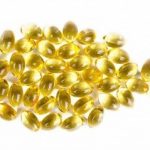Nutrition May Play an Omega Role in Treating Dry Eye Disease
Written by Dr. David Evans Last modified on December 6, 2018
Dry eye is an uncomfortable and unfortunately common eye condition that can interfere with your day-to-day quality of life. Depending on the severity and cause of dry eye, there are a variety of treatment options available including medicated eye drops, tear duct surgery, drugs designed to stimulate tear flow and others. But there is one treatment in particular that should be viewed as the first-line treatment in all cases of dry eye according to some experts evaluating the condition: nutritional therapy.
Omega-3s and Dry Eye

Healthy fats like omega-3 fatty acids play an essential role in health and wellbeing. Omega-3s can safeguard against heart disease, rheumatoid arthritis and even depression. Their role in eye health has been known for some time, but it might surprise you to learn that some experts believe that it should be the starting point in treating dry eye. This sentiment is echoed in a pair of reports published in 2007 and 2017 (the Tear Film & Ocular Surface Society Dry Eye WorkShop; otherwise referred to as DEWS I & II), in which omega-3 nutritional therapy is identified as “first-line treatment for even mild dry eye disease.”
What Causes Dry Eye?
Chronic dry eye syndrome is often caused as a result of meibomian gland dysfunction. The meibomian glands are in the upper eyelid and play a major role in lubrication of the eyes. The glands secrete essential oils that help to prevent tears from evaporating quickly. If the meibomian glands are not functioning correctly and secreting an adequate amount of oil, it can lead to tear evaporation and chronic dry eye.
It is believed that omega-3 supplementation could play a role in maintaining healthy meibomian glands when administered in the right dose and preparation.
Not all Omega-3s are Created Equal
The efficacy of omega-3 supplementation for the treatment of dry eye is not a wholly accepted position within the medical community, with some studies suggesting minimal-to-no benefit compared with a placebo. However it’s worth noting that not all omega-3s are created equal, and that over-the-counter or diet-based sources may not be sufficient. For example, plant-based omega-3s are not readily absorbable by the body, and over-the-counter supplements often contain alcohol to help with detoxification.
Omega-3s are found naturally through a variety of sources such as fish (salmon, mackerel, sardines, anchovies, etc.), walnuts and flaxseeds. However, for the best results, a physician-prescribed omega-3 supplement administered to exact specifications is needed.
Talk with Your Eye Doctor
If you are experiencing chronic bouts of dry eye, don’t just continue going through bottle after bottle of eye drops. Contact your eye doctor for an exam to determine the source of the issue, and ask him/her about the potential benefits associated with omega-3 supplementation. Depending on the underlying cause of your dry eye, your doctor may recommend an alternative course of treatment, but omega-3 supplementation is a simple, non-invasive first step to take in combating the condition. Plus it has the added benefit of supporting eye health in other ways.
Benefits Beyond Dry Eye
In addition to its benefits for dry eye sufferers, omega-3 fatty acids have been associated with a number of other vision health benefits. They are considered to be essential in the development of normal infant vision and can be found in breast milk and infant formulas. Omega-3s may also help protect against the development of serious eye conditions like macular degeneration and glaucoma. Talk to your doctor at your next checkup to learn more about the role that omega-3s may play in your vision health.
If you’re interested in learning more about the role that nutrition plays in eye health, I encourage you to check out our 6 Helpful Eye Health Nutrition Tips slideshow. You can also visit our eye health section for a broader array of topics.
You can also check out this article from Eyeworld.org detailing the Value of Omega-3 Supplementation.




